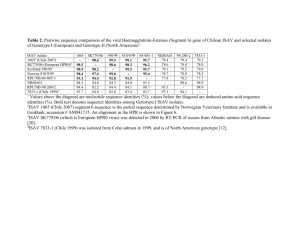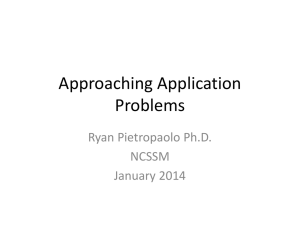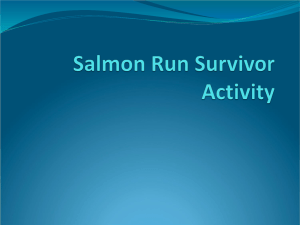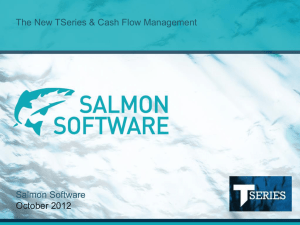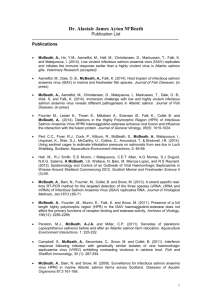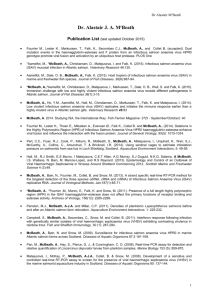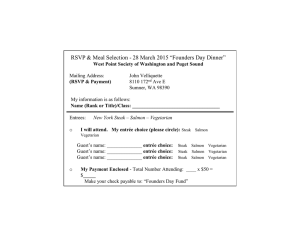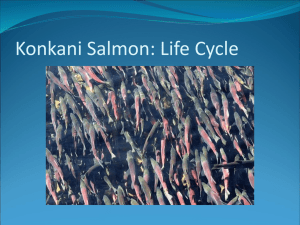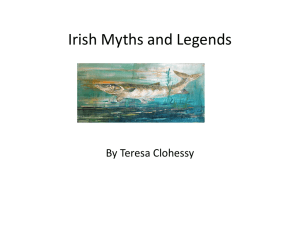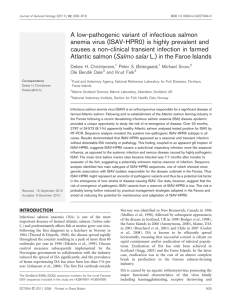(2011) Modelling the spread of infectious salmon anaemia
advertisement
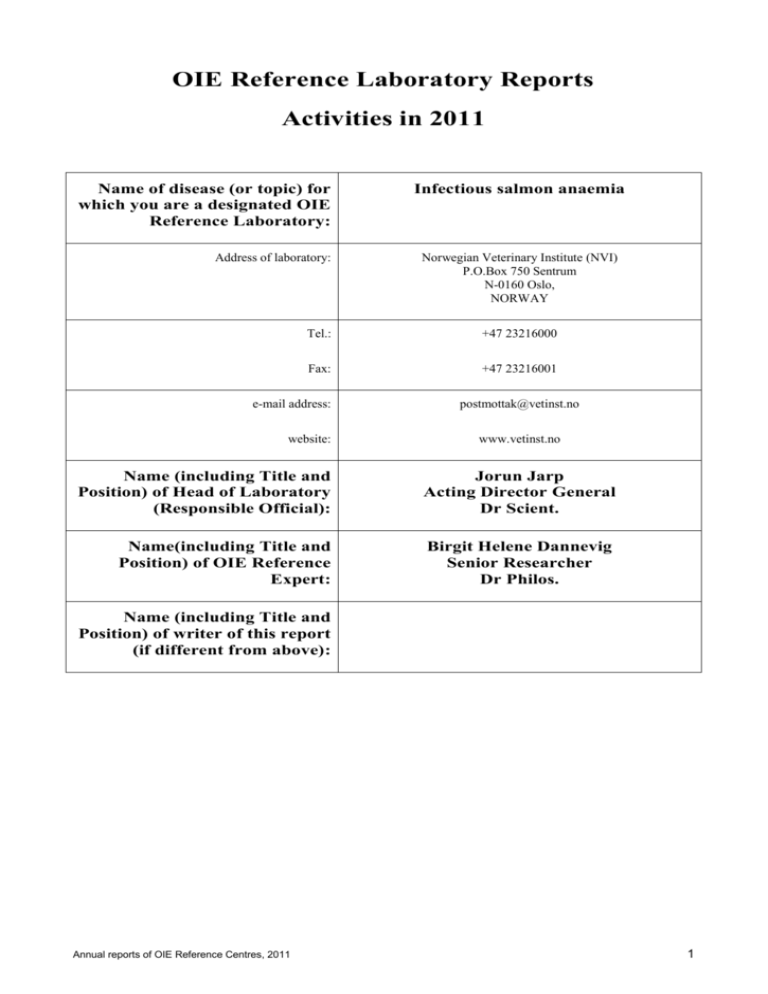
OIE Reference Laboratory Reports Activities in 2011 Name of disease (or topic) for which you are a designated OIE Reference Laboratory: Address of laboratory: Infectious salmon anaemia Norwegian Veterinary Institute (NVI) P.O.Box 750 Sentrum N-0160 Oslo, NORWAY Tel.: +47 23216000 Fax: +47 23216001 e-mail address: website: postmottak@vetinst.no www.vetinst.no Name (including Title and Position) of Head of Laboratory (Responsible Official): Jorun Jarp Acting Director General Dr Scient. Name(including Title and Position) of OIE Reference Expert: Birgit Helene Dannevig Senior Researcher Dr Philos. Name (including Title and Position) of writer of this report (if different from above): Annual reports of OIE Reference Centres, 2011 1 Infectious salmon anaemia Part I: Summary of general activities related to the disease 1. Test(s) in use/or available for the specified disease/topic at your laboratory Test For Specificity Total Autopsy* Macroscopic lesions Group 20 Histopathology Microscopic lesions Group 58 Immunohistochmistry Antigen Group 147 Immunofluorescence -Tissue imprints Antigen Group 15 Cell culture/IFAT Virus isolation/identification Group 15 Real-time RT-PCR Disease diagnostics Research/surveillance Virus RNA Group Sequencing Disease diagnostics Research/surveillance Gene (segment 5 and 6) 133 3100 Genotype 5 30 *Autopsy is mainly carried out by local officers from the Norwegian Food Safety Authority or by local fish health services. 2. Production and distribution of diagnostic reagents Type of reagent Cell cultures (SHK-1, ASK) ISAV reference strain Monoclonal anti-ISAV HE* antibody Rabbit monospecific antinucleoprotein antibody Amount supplied nationally (including for own use) Not supplied nationally to other laboratories. Continuous production for diagnostic purposes 10 ml Amount supplied to other countries 6 small flasks 3 vials Not supplied nationally to other national laboratories Not supplied to other countries In use for routine diagnostics *HE – haemagglutinin esterase 2 Annual reports of OIE Reference Centres, 2011 Infectious salmon anaemia Part II: Activities specifically related to the mandate of OIE Reference Laboratories 3. International harmonisation and standardisation of methods for diagnostic testing or the production and testing of vaccines a) Establishment and maintenance of a network with other OIE Reference Laboratories designated for the same pathogen or disease and organisation of regular inter-laboratory proficiency testing to ensure comparability of results No activity b) Organisation of inter-laboratory proficiency testing with laboratories other than OIE Reference Laboratories for the same pathogens and diseases to ensure equivalence of results Participation in international ring trials Participated in the Inter-laboratory Proficiency Test 2011, organised by the European Union Reference laboratory for Fish Diseases, National Veterinary Institute DTU, Arhus, Denmark. ISAV was included in the test. Organisation of international ring trials Organised an ISAV-proficiency test for Laboratorio de Patógenos Acuícolas, Pontificia Universidad Catolica de Valparaiso, Valparaiso, Chile (December 2011). 4. Preparation and supply of international reference standards for diagnostic tests or vaccines Country Material Amount Finland SHK-1 cells 2 small flasks Spain ISAV reference strain 1 vial ASK cells 2 small flasks Tunisia ASK cells ISAV reference strain Litauen 5. ISAV reference strain 2 small flasks 1 vial 1 vial Research and development of new procedures for diagnosis and control A real-time RT-PCR method which detect only ISAV HPR0 variants has been established. Validation of the method with respect to sensitivity and specificity is in progress. (Financed by NVI). Tracing viral disease dissemination in aquaculture: an interdisciplinary approach between molecular virology and dispersal modelling (Part II) (Project management: NVI. Financed by the Research Council of Norway, RCN). In collaboration with a parallell project in Chile. Characterisation of ISA HPR0 virus- and infection in Atlantic salmon. (Project management: NVI. Financed by RCN, Norway) Annual reports of OIE Reference Centres, 2011 3 Infectious salmon anaemia Vaccine-related projects Virulence and Host-Pathogen Interactions (Sub-project at NVI). Part the Atlantic Innovation Fund Canada programme: “Mitigation of ISA by Vaccination and Genetic Selection” (Project management: Novartis Aqua Health, PEI, Canada) Platform for Viral Aquamedicine (Project management: NVI. Financed by RCN, Norway) Application of a new principle to combat infectious salmon anemia (ISA). (Project management: NVI. Financed by RCN, Norway) 6. Collection, analysis and dissemination of epizootiological data relevant to international disease control Epizootiological data are continously collected from recent outbreaks of ISA. All ISAV isolates are currently sequenced and genotyped. 7. Maintenance of a system of quality assurance, biosafety and biosecurity relevant to the pathogen and the disease concerned The quality assurance system at NVI is based on NS-EN ISO/TEC 17025. The real-time RT-PCR method for detection of ISAV has been prepared for accreditation. 8. Provision of consultant expertise to OIE or to OIE Member Countries 9. Manual of Diagnostic Tests for Aquatic Animals, Chapter on Infectious Salmon Anaemia: o Updated the chapter in April 2011 o Revised the text in December 2011 according to the changes ammended in the report from the Ad hoc group on Pathogen Differentiation in Aquatic Animals. Attended the OIE Ad hoc group meeting on Pathogen Differentiation in Aquatic Animals, Paris, September 6-8, 2011, with emphasis on ISAV. The resulting report is submitted to member countries for comments. Provision of scientific and technical training to personnel from other OIE Member Countries See Section 11. 10. Provision of diagnostic testing facilities to other OIE Member Countries None 11. Organisation of international scientific meetings on behalf of OIE or other international bodies Workshop on Surveillance and Epidemiology of Aquatiq Animal Diseases, Copenhagen, Denmark 23-24th Novmber 2011. Organized by the European Commision by the European Union Reference Laboratory for Fish Diseases in collaboration with the EURL for molluscs and crustacean diseases, respectively. Directed by the OIE collaborating centre for Aquatic Epidemiology and Risk Assessment. Oral presentation by T.M. Lyngstad: Use of molecular epidemiology in tracing disease: Tracing transmission pathways of ISA virus 4 Annual reports of OIE Reference Centres, 2011 Infectious salmon anaemia 12. Participation in international scientific collaborative studies None 13. Publication and dissemination of information relevant to the work of OIE (including list of scientific publications, internet publishing activities, presentations at international conferences) Presentations at international conferences and meetings Aamelfot, M,. Dale, O.B., Weli, S., Koppang, E.O., Falk, K. Infectious salmon anaemia virus is an endotheliotropic virus, and cell tropism is determined by the 4-0-acetylated sialic acid receptor. 15th International Conference on Diseases of Fish and Shellfish. Split, September 12-16, 2011. Hauge H, Ramsell JNE, I. Hedfors, Grimholt U, Bogen B , Mjaaland, S. Application of a new vaccine principle to combat infectious salmon anemia virus (ISAV) – a piscine orthomyxovirus. The fourth ESWI Influenza conference, 11-14 September 2011, Malta. Lyngstad TM, Hjortaas MJ, Kristoffersen AB, Devold M, Aspehaug V, Østvik A, Larssen RB, Jansen PA. Phylogeographic distribution of Infectious salmon anaemia (ISAV) HPR0 sub types in farmed Atlantic salmon in Norway. 15th International Conference on Diseases of Fish and Shellfish. Split, September 12-16, 2011. Markussen M, Sindre H, Christiansen DH, Hjortaas M, Dale OB, Falk K. Comparative Aspects of Infectious Salmon Anaemia Virus, a Fish Orthomyxovirus, and Influenza Viruses. The fourth ESWI Influenza conference, 11-14 September 2011, Malta. Scientific publications in peer-reviewed journals Aldrin M, Lyngstad TM, Kristoffersen AB, Storvik B, Borgan Ø, Jansen PA (2011) Modelling the spread of infectious salmon anaemia among salmon farms based on seaway distances between farms and genetic relationships between infectious salmon anaemia virus isolates. J R Soc Interface. 8(62):1346-56. Christiansen D.H., Østergaard P.S., Snow M., Dale O.B., Falk K. (2011). A low-pathogenic variant of infectious salmon anemia virus (ISAV1 - HPR0) is highly prevalent and causes a non-clinical transient infection in farmed Atlantic salmon (Salmo salar L.) in the Faroe Islands. J. Gen. Virol., 92, 909–918. Hetland DL, Dale OB, Skjødt K, Press CM, Falk K. (2011) Depletion of CD8 alpha cells from tissues of Atlantic salmon during the early stages of infection with high or low virulent strains of infectious salmon anaemia virus (ISAV). Dev Comp Immunol. 5(8):817-26 Lauscher A, Krossøy B, Frost P, Grove S, König M, Bohlin J, Falk K, Austbø L, Rimstad E (2011) Immune responses in Atlantic salmon (Salmo salar) following protective vaccination against infectious salmon anemia (ISA) and subsequent ISA virus infection. Vaccine.29(37):6392-401. Lyngstad T.M., Hjortaas M.J, Kristoffersen A.B, Markussen T., Karlsen E.T., Jonassen C.M. , Jansen P.A. (2011). Use of molecular epidemiology to trace transmission pathways for infectious salmon anaemia virus (ISAV) in Norwegian salmon farming. Epidemics, 3, 1–11. McBeath A, Fourrier M, Munro E, Falk K, Snow M. (2011) Presence of a full-length highly polymorphic region (HPR) in the ISAV haemagglutinin-esterase does not affect the primary functions of receptor binding and esterase activity. Arch Virol.156(12):2285-9. Rimstad, E, Dale, OB, Dannevig, BH, Falk, K. (2011) Infectious Salmon Anaemia. In CAB International 2011. Fish Diseases and Disorders Vol. 3, 2nd Edition: Viral, Bacterial and Fungal Infections (eds P.T.K. Woo and D.W. Bruno), CAB International, Oxfordshire, UK Schiøtz BL, Rosado EG, Baekkevold ES, Lukacs M, Mjaaland S, Sindre H, Grimholt U, Gjøen T. (2011) Enhanced transfection of cell lines from Atlantic salmon through nucoleofection and antibiotic selection.BMC Res Notes. 2011 May 6;4:136 _______________ Annual reports of OIE Reference Centres, 2011 5
